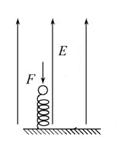问题
选择题
如图所示,在竖直向上的匀强电场中,绝缘轻质弹簧直立于地面上,上面放一个质量为m的带负电的小球,小球与弹簧不连接。现用外力将小球向下压到如图所示的位置后撤去外力,小球从静止开始运动到刚离开弹簧的过程中,小球克服重力和电场力做功分别为W1和W2,小球刚好离开弹簧时速度为v,不计空气阻力,则上述过程中

A.带电小球电势能增加W2
B.弹簧弹性势能最大值为W1+W2+ mv2
mv2
C.弹簧弹性势能减少量为W2+W1
D.带电小球和弹簧组成的系统机械能减少W2
答案
ABD
题目分析:据题意,小球电势能增加量等于电场力所做的功,即 ,选项A正确;从撤去外力到弹簧回复原长,据动能定理有:
,选项A正确;从撤去外力到弹簧回复原长,据动能定理有: ,又因为弹性势能变化量等于弹力所做的功,即:
,又因为弹性势能变化量等于弹力所做的功,即: ,故选项B正确而选项C错误;系统机械能变化量等于电场力做的功,即:
,故选项B正确而选项C错误;系统机械能变化量等于电场力做的功,即: ,故选项D正确。
,故选项D正确。
